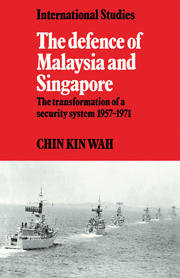Book contents
- Frontmatter
- Contents
- Preface
- Acknowledgements
- List of abbreviations
- Note on currency units
- 1 Introduction
- 2 Pre-treaty defence relations
- 3 Decolonisation and the institution of the defence agreement
- 4 The extension of AMDA
- 5 The external testing of AMDA
- 6 Towards a closing of ranks
- 7 The fractured axis
- 8 Britain weighs anchor
- 9 From AMDA to the five-power defence system
- 10 Conclusions
- Postscript on five-power arrangements
- Notes
- Bibliography
- Index
- Frontmatter
- Contents
- Preface
- Acknowledgements
- List of abbreviations
- Note on currency units
- 1 Introduction
- 2 Pre-treaty defence relations
- 3 Decolonisation and the institution of the defence agreement
- 4 The extension of AMDA
- 5 The external testing of AMDA
- 6 Towards a closing of ranks
- 7 The fractured axis
- 8 Britain weighs anchor
- 9 From AMDA to the five-power defence system
- 10 Conclusions
- Postscript on five-power arrangements
- Notes
- Bibliography
- Index
Summary
During the fourteen years that followed Malayan independence in 1957 the formal context for the defence of Malaya (subsequently Malaysia) and Singapore was set by the Anglo-Malaysian Defence Agreement or AMDA. This ‘unequal burden treaty’, embodying a ‘blank cheque’ from Britain, had had no parallel elsewhere in Southeast Asia. The unique structure of this alliance was characterised by a hierarchy of powers embracing a hierarchy of roles. The AMDA system contained one anchor power (Britain), two principal consumers of alliance security (Malaysia and Singapore), and two associate powers (Australia and New Zealand) which were both providers and consumers of alliance security.
AMDA emerged against the background of an increasingly bipolar world in which alliances tended to be the most overt expression of either Western or Soviet spheres of interest. However, AMDA's essential function was to facilitate an orderly process of colonial disengagement from Malaya rather than to add to a growing ‘cold war front’ in Southeast Asia. In that sense AMDA contained an inherent paradox, i.e. that an effective functioning of the alliance in the face of external threat depended on a military reinvolvement by the ex-colonial anchor power. AMDA facilitated colonial disengagement, but for AMDA to work re-engagement of a different kind might be necessary.
This assumption of post-colonial responsibility was never seriously questioned in Britain at the time of AMDA's formation.
- Type
- Chapter
- Information
- The Defence of Malaysia and SingaporeThe Transformation of a Security System 1957–1971, pp. 1 - 7Publisher: Cambridge University PressPrint publication year: 1982

